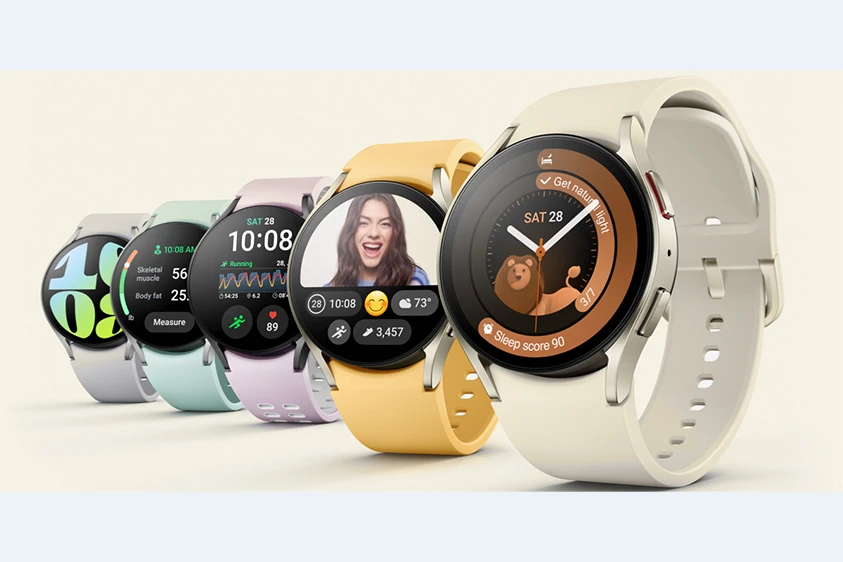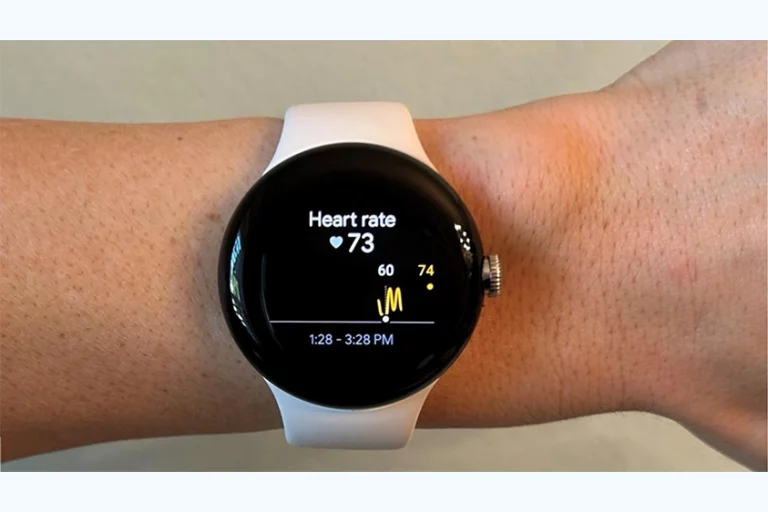Samsung Smart Watches Will Detect Sleep Apnea
The modular nature of technology is being demonstrated by Samsung through the integration of its sleep apnea detection function into its Health Monitor app for the Galaxy Watch 5 and Watch 6 series. Identifying moderate to severe sleep apnea is the goal of this groundbreaking feature, a sleep disorder that affects millions of people worldwide. Through the use of the BioActive Sensor in the Galaxy Watch, Samsung enables users to keep an eye on their blood oxygen levels as they sleep and estimate their AHI (Apnea Hypopnea Index).
It will be a South Korea exclusive at first for this sleep apnea detection feature. It plans to expand its availability to other countries in the future. Since the sleep insights that Galaxy Watch 5 and Galaxy Watch 6 users will hopefully get are blaring insight into their patterns, and hopefully this will also aid in better sleep (and thus better life). But know that this feature is meant for users 22 and older and shouldn’t be used by those who already have been diagnosed with sleep apnea.
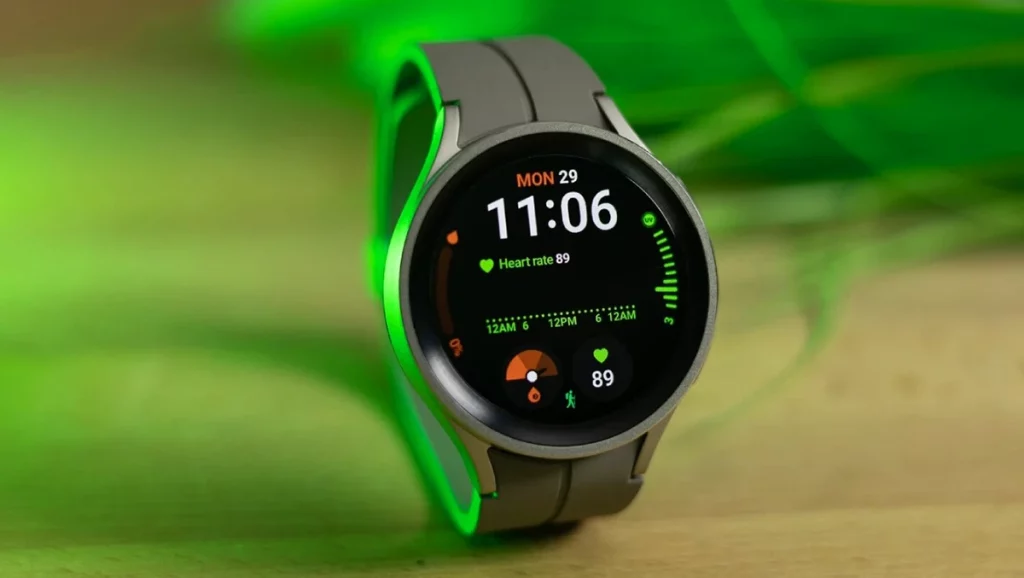
Samsung’s Presence in the Smartwatch Market
Samsung has been around in the smartwatch market for years. Over the years, they have pushed and pushed with their features and their advancement in technology. If you’re a user of Samsung Smartwatches, you’ll have smarter ways to stay organized and close to your people.
But the Galaxy Watch series has caught on with consumers. With the Galaxy Watch 5 and Galaxy Watch 6, these latest versions of this lineup have taken the smartwatch experience to a new level. One wonderful thing about these devices is that they can detect sleep apnea. Sleep apnea is a disorder in which a person’s breathing repeatedly stops and starts while they are asleep, which can make a person get very little sleep and can increase health risks.
Their bioactive sensor can indicate whether a person has sleep apnea. This sensor monitors blood oxygen levels while sleeping. Detects values it analyzes to see if one has moderate to obstructive sleep apnea. Users can get insight into their sleeping patterns by estimating the Apnea Hypopnea Index (AHI). Can take action if needed.
This sleep apnea detection function was initially available only in South Korea. It’s now expanded to countries as well. It shows how Samsung is willing to ship the stuff that improves people’s lives.
Samsung smartwatches not only detect sleep apnea but also record and offer the full range of sleeping data through the Samsung Health app: the sleeping duration, snoring cases if any, and advice on how to improve your sleeping quality. Also, users are able to manage televisions, making it easier to promote sleep patterns.
Finally, it’s undeniable that Samsung has a role in the smartwatch environment. For example, their Galaxy Watch 5 and Watch 6 include sleep apnea detection, which adds to that mission. Samsung’s innovation and added smart features will enable the company to retain its position as part of the smartwatch industry for many years.
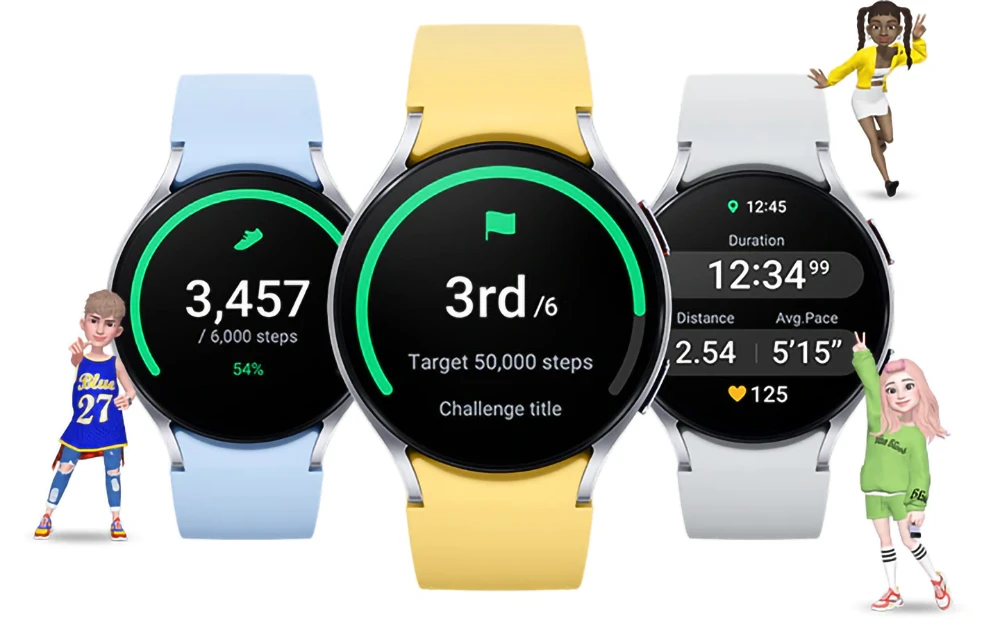
Features of Samsung Smart Watches
There are a number of features available on Samsung smart watches that make your life better, and they are able to detect sleep apnea. Their comprehensive sleep monitoring functions help to track your sleep patterns and your overall health.
Sleep Monitoring and Apnea Detection: Track your sleep duration, record episodes of you snoring, and spot sleep apnea on the Galaxy Watch 5 or Galaxy Watch 6 from Samsung. But that functionality is not yet an option in any country except South Korea, and stages are intending to make it available in all countries. Comprehensive with the Samsung Health app, it works seamlessly to give you information about your sleep habits and coaching options for improving your quality of sleep.
Heart Rate Monitoring: Furthermore, these intelligent timepieces include heart rate monitoring as part of the process of monitoring your rate so you get a comprehensive picture of your overall well-being. There are many stress indicators that you can monitor through your heart rate. Change your lifestyle so you will be healthy.
Stress Tracking: The Samsung Health app, used paired with a smartwatch, features the ability to track stress, so you know when to monitor stress levels yourself. The app can rate your stress levels based on analysis of your heart rate data, sleep patterns, and blood oxygen levels. The information helps one to manage or lessen stress that can lead to a lifestyle.
Smart Device Control: Besides giving you the convenience of controlling devices in your home, Samsung smartwatches also offer health benefits. One example is being able to use your watch to monitor your TV usage and not warrant staying up watching shows or movies. By integrating these devices into your watch, you get a seamless and organized daily routine.
Not connectivity, not convenience, are what Samsung smartwatches have to offer. They can also aid your health by tracking your sleep patterns, measuring your heart rate, and helping you cope with stress. Bearing an eye to advances and improvements for their capabilities and features in sleep apnea detection is worth.
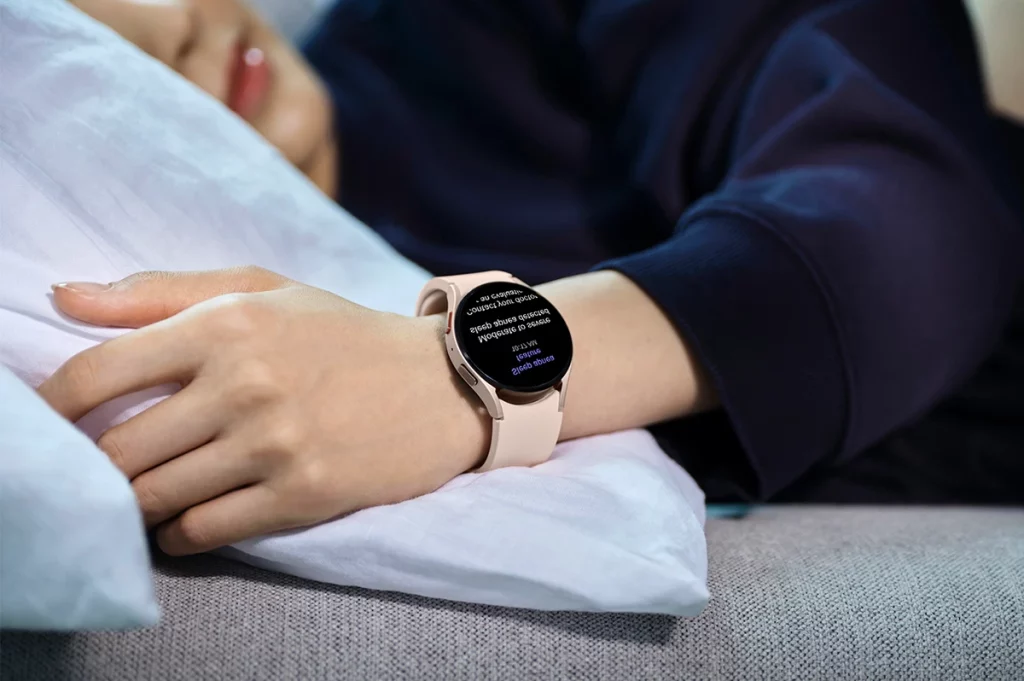
Understanding Sleep Apnea
Repeated interruptions in breathing while sleeping are known as sleep apnea. They are the result of the muscles on the back of your throat failing to keep your airway open despite your efforts to breathe. This means that your brain will wake you up briefly so that you don’t even notice it, opening the airway. Chronic disturbance of your sleep can cause health problems such as tiredness, possessiveness, blood pressure, heart problems, and so on.
There are three types of sleep apnea: central sleep apnea (CSA), complex sleep apnea syndrome (CSAS), as well as sleep apnea (OSA). Form is known as OSA and is caused by physical obstruction of the airway. CSA is less prevalent. It happens because the brain and muscles responsible for breathing can’t communicate with each other. Complex sleep apnea syndrome (CSA + OSA) means that a person had OSA and CSA all at the same time.
Symptoms of sleep apnea include snoring, gasping, choking, or’respiratory effort’ and difficulty maintaining a slumber, excessive daytime drowsiness, and morning headaches. But you should know that not everyone who snores does have sleep apnea, while sleep apnea may or may not cause one to snore.
Risk factors for sleep apnea include obesity, family history, smoking, alcohol, and medical problems like hypothyroidism and acromegaly. Men are generally at greater risk for sleep apnea than women, but after menopause, the risk rises for women.
Most people do require a sleep study to diagnose sleep apnea. This can be done either in a lab or at home. The term refers to monitoring and analysis of breathing patterns in people sleeping. The treatment options for sleep apnea depend on the severity and type thereof. If there are things you can do to help, such as losing weight, exercising, and avoiding alcohol and sedatives, then you can change your lifestyle. Continuous positive airway pressure (CPAP) therapy is an used treatment for moderate to severe cases. That means using a machine that forces air pressure to keep the airway open while you sleep. Appliances and positional therapy are other treatment options. Sometimes surgery.
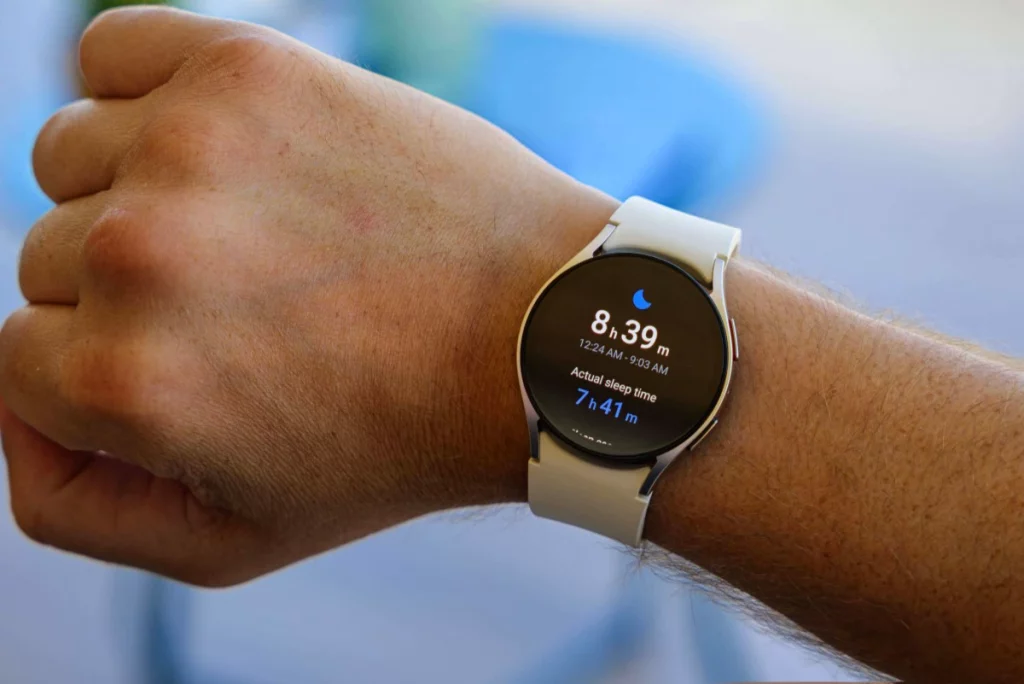
How Samsung Smart Watches Can Detect Sleep Apnea
By incorporating sleep apnea detection functionality, Samsung has moved successfully into the field of sleep health with its smartwatches. South Korea’s Ministry of Food and Drug Safety has approved the use of this feature in the Samsung Health Monitor app on Galaxy Watch 5 and Galaxy Watch 6 in models of South Korea.
Detecting Sleep Apnea
Samsung smart watches work together with sensors and advanced algorithms to detect sleep apnea. Our smartwatches can also monitor sleep quality as well as the vital signs that indicate sleep apnea without a formal diagnosis. This feature basically includes;
- Make sure you keep an eye on your oxygen levels in the blood.
- Heart rate reading and other vital sign monitoring
- Recording patterns of snoring
Using Samsung Smartwatches for Sleep Apnea Detection
To use it, however, you’ll need to set up your smartwatch with the Samsung Health Monitor app and turn on the sleep tracking function. The smartwatch will monitor your signs while you sleep. Analyze your sleep patterns. By gathering this data throughout the night, we’ll be able to see if there are any irregularities—breaths or quick jolts—that might indicate sleep apnea.
This being said, it’s important to comprehend that Samsung smartwatches can show you insights about your sleep health or maybe alert you to the possibility of sleep apnea but are not meant to be a replacement for complete sleep studies or professional medical diagnoses.
The Advantages of Detecting Sleep Apnea
The sleep apnea detection feature is specifically designed for Samsung Galaxy Watch 5 and Watch 6 series users. If you own one of these smartwatches, you can take advantage of this health-focused advancement. Unfortunately, Galaxy Watch 4 owners won’t have access to this feature even though their watches are powered by the Wear OS 4 software.
The second is the advantage of the convenience of tracking your sleep patterns from your home. For example, an overnight stay at a clinic to monitor your sleep patterns is a typical part of a traditional diagnosis for sleep apnea. But with Samsung’s sleep apnea detection feature, you can keep track of what you’ve been sleeping on without stepping out of the bedroom. This will increase your comfort, cause minimal disturbance to your routine, and offer up the possibility of reducing the expense of visits to a sleep clinic.
It also means that sleep apnea can be detected through Samsung smartwatches. You will find that when sleep apnea is identified and treated, your oxygen levels are increased, which means restful and rejuvenating sleep. You can easily monitor sleep quality by watching sleep patterns through a smartwatch. Optimize your rest by making informed lifestyle choices.
In resume, adding a sleep apnea detection ability to your Samsung smartwatch is good for your well-being and your health. Included in these are detection, convenient at-home monitoring, and sleep quality. With a smartwatch that has these features, you invest in yourself for sleep health and a life.
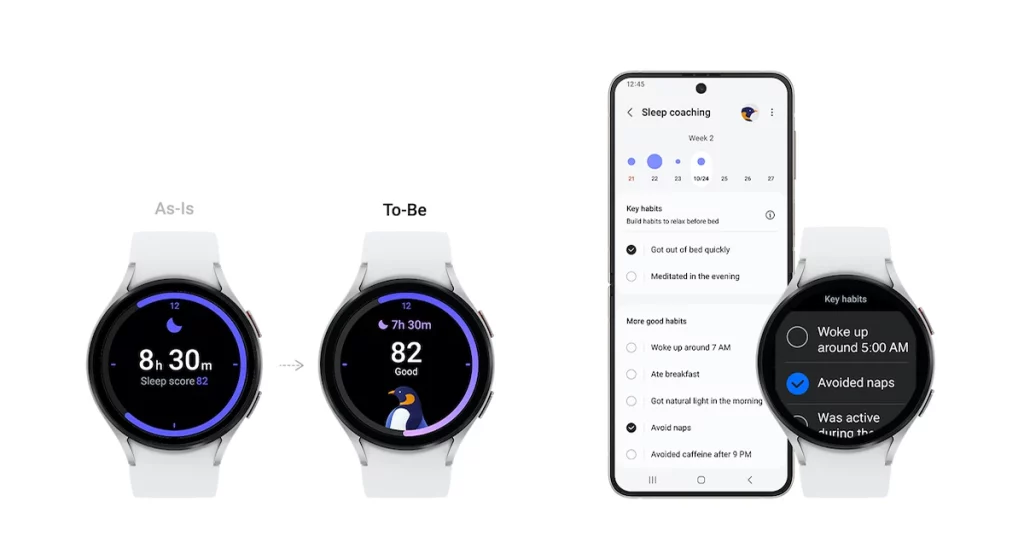
Who Can Use Sleep Apnea Detection Feature
While the sleep apnea detection feature is developed for Samsung Galaxy Watch 5 and Watch 6 series users, anyone can try it out. This health-focused advancement is available if you own one of these smartwatches. Unfortunately, Galaxy Watch 4 owners, even with the Wear OS 4 software, still won’t get this feature.
Samsung wanted to help with detecting symptoms of sleep apnea (OSA). The watch, equipped with its built-in BioActive sensor, will keep track of your blood oxygen levels throughout the sleep. Using this info, the Galaxy Watch can look at whether you get OSA and how it thinks you’re sleeping.
We expect the Galaxy Watch series to arrive with a sleep apnea feature in Korea this year, provided we receive approval from Korea’s Ministry of Food and Drug Safety (MFDS). We will keep you posted about the release and availability of this health monitoring tool in additional regions.
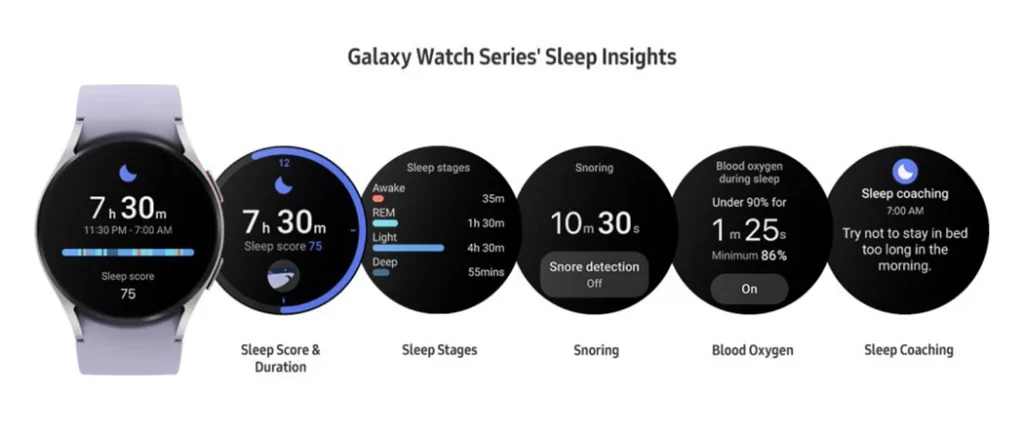
Comparing Samsung’s Technology with Sleep Monitoring Technologies
Samsung’s sleep apnea detection technology is a step forward for wearable devices. But it’s important to contrast with technologies able to monitor sleep patterns and identify sleep disorders.
Not surprisingly, the latest smart watches from Samsung and Google’s Pixel Watch 2 have sensors and algorithms to detect sleep apnea. It sports a heart rate sensor, making sure sleep and fitness tracking will be highly accurate with its results. Wear OS 4 also runs on the Samsung Galaxy Watch 6 and Google Pixel Watch 2, which also means that they are compatible and have a relatively beefy component.
Fitbit is another great wearable device that is available on the market. And FitBit smartwatches and fitness trackers have earned a reputation for being capable sleep trackers. Insights into sleep stages and even a sleep score to measure total sleep quality are provided. In addition, Fitbit devices have a built-in sensor and indirectly help detect sleep apnea by measuring oxygen levels during sleep.
Below is a comparison of features related to sleep:
| Feature | Samsung Smartwatches | Google Pixel Watch 2 | Fitbit |
|---|---|---|---|
| Sleep Tracking | Yes | Yes | Yes |
| Sleep Stages Analysis | Yes | Yes | Yes |
| SpO2 Sensor (For Blood Oxygen Level) | Yes | No | Yes |
| Sleep Apnea Detection | Yes | No | No (Indirect) |
These devices don’t compare to Samsung’s sleep apnea detection technology. This groundbreaking feature may dramatically improve the diagnosis and treatment of sleep apnea for millions who suffer from this sleep disorder. But it’s important to note that while no device is perfect, any device should always be validated by a professional.
Potential Challenges and Solutions
It’s true that smartwatches by Samsung offer a device that can be used to detect sleep apnea, but there may be challenges when trying to utilize a Samsung smartwatch.
The data collected is one challenge; it’s not always accurate. The sensors on smartwatches are less precise than those used in sleep studies. In order to overcome this problem, Samsung has conducted research. For example, you’re investing in refining their detection algorithms, like their Galaxy Watch 4. Our therapy of improving these algorithms and incorporating sensors gets us closer to detecting sleep apnea more accurately over time.
Another user compliance and comfort challenge. Some are bothered by wearing a smartwatch to sleep. For data, you have to ensure that you are properly wearing the watch. Companies like Samsung might gain benefit by creating watches with a fit and clear instructions on how to wear them properly in order to achieve the highest possible accuracy of detecting sleep apnea.
Additionally, there could be even more worries around the privacy risks of monitoring health with smartwatches. Samsung should then communicate to ease those concerns as to how they collect data. Take steps to protect the data of such a user. There can be a few things that it involves: encrypting the data, establishing privacy policies, and giving users control over how and to whom their data will be shared.
With smartwatch data, there is also the challenge of interpreting and using it. The solution is offering zero guidance and recommendations to the user, simply detecting if the user has sleep apnea. In order to overcome this problem, Samsung could collaborate with professionals who create materials and support systems in order to fit into their smartwatch app or platform. By enabling the users to use the sleep apnea detection features, the approach will lead to overall health outcomes.
Finally, many of these potential challenges can be overcome by Samsung by enhancing detection algorithms accuracy, ensuring user comfort and compliance, addressing privacy concerns transparently, and giving guidance to users. With this, smartwatches will become a solution to detect sleep apnea.
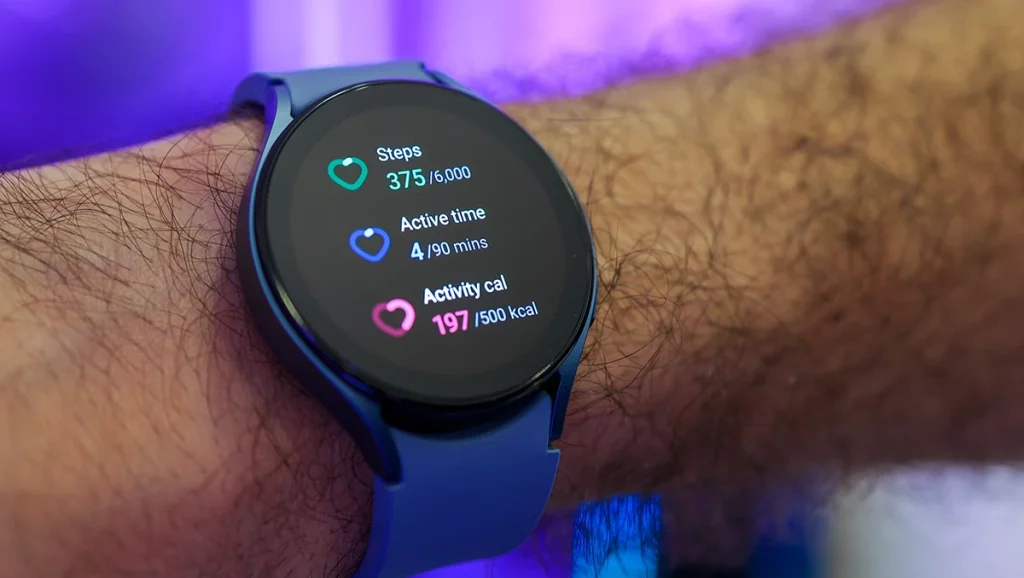
The Future of Sleep Apnea Detection in Smart Watches
Getting wearable technology to be more useful beyond being solely just under-the-skin devices should include sleep apnea detection on Samsung’s smartwatches, for starters. By adding this feature into the Galaxy Watch 5 and Watch 6 series, Samsung is ahead in bringing diagnosis. Improved health outcomes in those with sleep apnea.
You have your smartwatch, which collects data when you wear it, but it does it while you sleep. This data reveals breathing-appearing pattern disruptions, which may suggest sleep apnea. Samsung’s Health Monitor app then brings together this information with health metrics to give you a picture of how you’re tracking your whole sleep health level. What we can also expect in the future is better, more advanced algorithms and innovations to refine our detection even more.
Another area of sleep apnea detection in smartwatches is real-time monitoring and alerts. If we can build these products with advanced wearables, they may also be able to sense apnea events as they happen and make corrections like changing your position or taking an action to not affect your health.
It is part of a trend towards making devices smarter, with the incorporation of sleep apnea detection into smartwatches meant to make them better at sensing health. The technology that drives these devices changes, and you can expect your smartwatch to be able to sense, monitor, and alert you to many different health conditions. This gains you a particular level of self-awareness, which enables you to make the best choices in relation to the condition of your health.
The smartwatch is but the first step towards integrating sleep apnea detection. Which in turn will be made possible through the efforts of technology companies, medical experts, and the contributions of folks like yourself to improve the experience of wearing health monitoring. Today, more and more people are using smartwatches to manage their own health, making sleep apnea detection and management seem like a bright future.

